Key takeaways
- Social contract theory emphasizes the balance between personal freedom and collective responsibility, highlighting the importance of mutual trust in forming societies.
- Rousseau’s concept of the “general will” challenges individuals to consider the common good over personal interests, encouraging active participation in societal governance.
- Teaching social contract theory fosters critical thinking among students, prompting them to question the foundations of social rules and their role within them.
- The ongoing negotiation between liberty and security reflects the dynamic nature of social contracts, requiring continual reflection and active engagement in community matters.
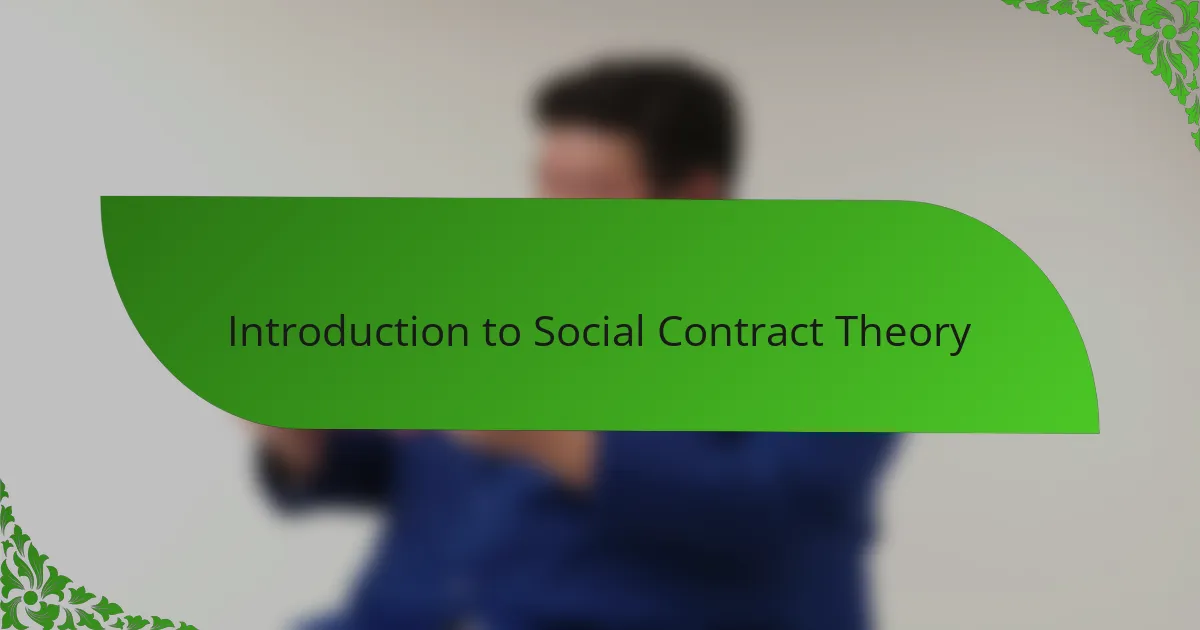
Introduction to Social Contract Theory
Social contract theory has always fascinated me because it asks such a fundamental question: why do we agree to live under rules in the first place? At its core, it suggests that society functions because individuals consent to surrender some freedoms in exchange for protection and order. This idea challenges me to think deeply about the balance between personal liberty and collective responsibility.
When I first encountered social contract theory, I couldn’t help but wonder—what motivates people to trust one another enough to form a society? It’s more than just laws on paper; it’s a shared understanding that shapes how we interact every day. Experiencing this concept personally made me appreciate the invisible bonds holding communities together.
Reflecting on this theory, I realized it’s not just abstract philosophy but a living, breathing agreement that influences our daily choices. How often do we stop to consider the social contracts we implicitly accept? This insight made me more aware of the delicate negotiations underlying human cooperation.
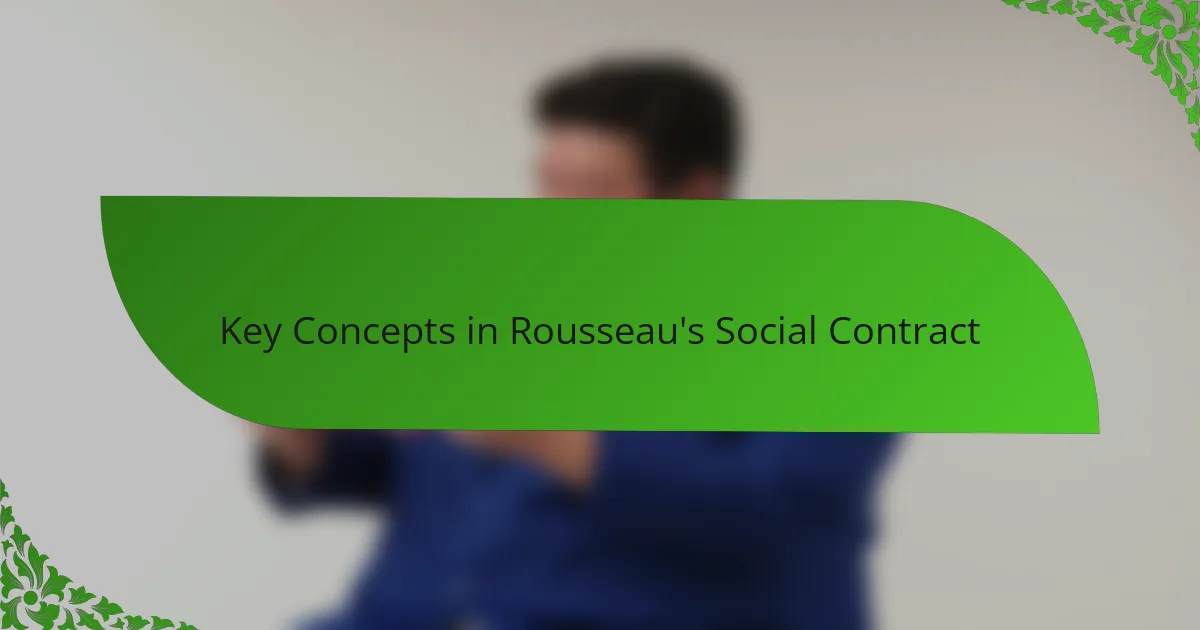
Key Concepts in Rousseau’s Social Contract
One of the key ideas Rousseau introduces is the concept of the “general will.” At first, I struggled to grasp what it truly meant, but over time, I came to see it as the collective interest of the people, something that transcends individual desires. This made me question: how often do our personal interests align with what’s best for the whole community?
Another concept that caught my attention is the idea of freedom through participation. Rousseau argues that individuals are truly free only when they obey laws they have a hand in making. Reflecting on this, I realized that genuine freedom isn’t just doing whatever we want—it’s about engaging actively in the decisions that govern us. That shift in understanding changed how I viewed my role in society.
Lastly, the tension between natural liberty and civil liberty stood out to me. Rousseau suggests we trade the unlimited freedom we have in the state of nature for the security and order of civil society. I remember feeling a bit uneasy with this trade-off at first. Isn’t giving up freedom risky? But then I saw how this balance is essential for living together peacefully, which made me appreciate the social contract’s deeper wisdom.
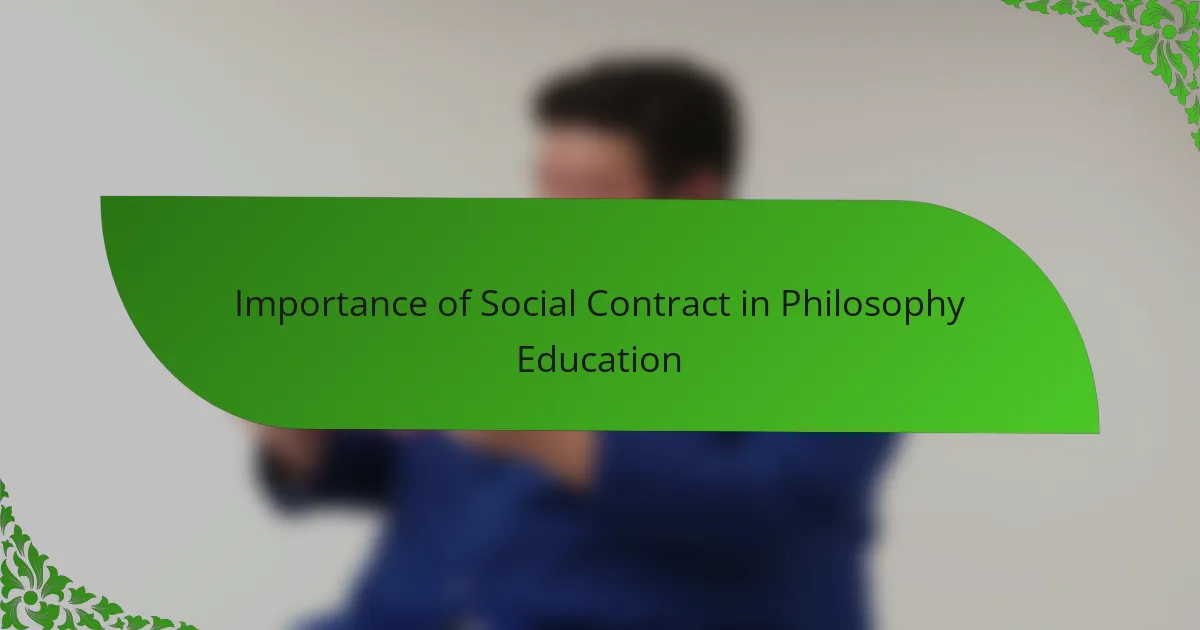
Importance of Social Contract in Philosophy Education
I’ve found that teaching the social contract in philosophy opens up a unique space where students begin to question the very foundations of society. It’s not just about memorizing theories—it’s about encouraging them to ask, “Why do we accept certain rules, and how do these rules shape my life?” This kind of reflection makes philosophy education feel alive and deeply relevant.
When I discuss Rousseau’s ideas with students, I notice a shift in their perspective—they start to understand that society’s stability depends on more than laws; it hinges on shared agreements and trust. This realization often sparks emotional responses, a mix of surprise and curiosity, which I believe is essential for meaningful learning.
I sometimes wonder if we really appreciate how much we participate in social contracts daily. Bringing this up helps students see philosophy not as distant theory but as an everyday negotiation. This personal connection makes the concept stick—and that’s when philosophy truly fulfills its educational purpose.
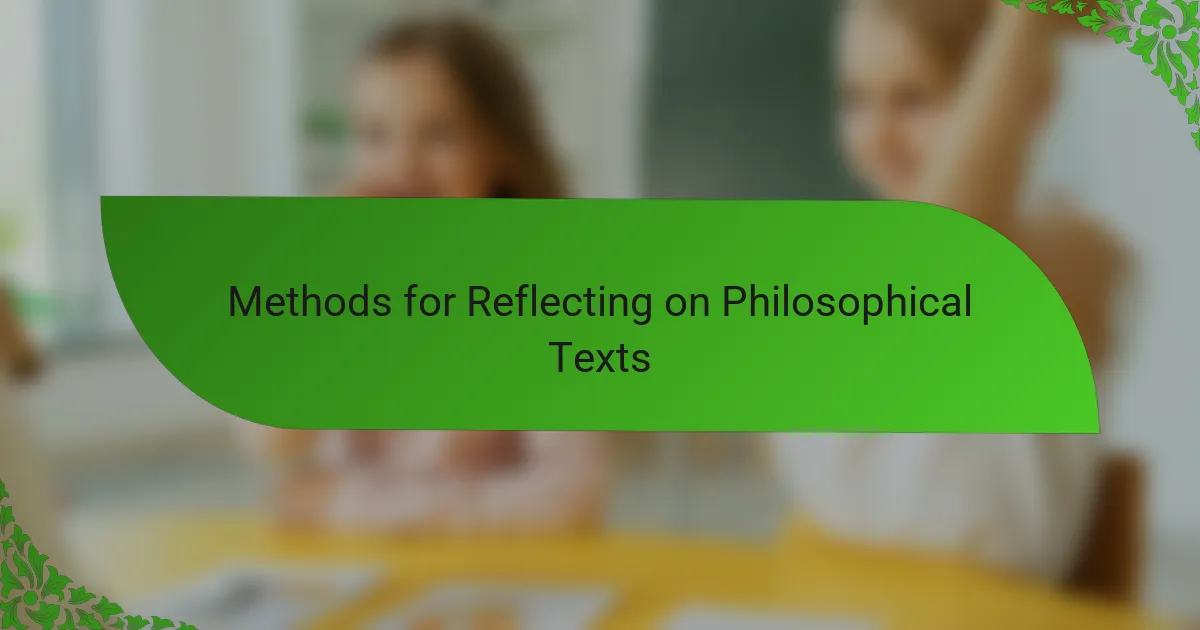
Methods for Reflecting on Philosophical Texts
When I approach a philosophical text like Rousseau’s Social Contract, I find it crucial to start by reading it slowly and letting the ideas sink in. Sometimes, I underline passages that strike me or jot down questions that pop up—this keeps me actively engaged rather than passively skimming. Have you ever tried talking through complex ideas aloud? That often helps me clarify my thoughts and catch subtle meanings I might miss otherwise.
Another method I rely on is comparing the text with contemporary examples or my own experiences. For instance, thinking about how Rousseau’s “general will” plays out in today’s politics makes his abstract ideas feel surprisingly tangible. This connection between theory and real life not only deepens understanding but sparks a kind of curiosity that motivates me to keep exploring.
Reflective writing is also a powerful tool. Writing down my responses forces me to articulate my stance and confront any confusion or disagreements. I remember once wrestling with Rousseau’s trade-off between freedom and security—putting those thoughts on paper helped me untangle my initial unease and see the balance he proposes in a new light. Have you tried this with a philosophical text? It can be surprisingly revealing.
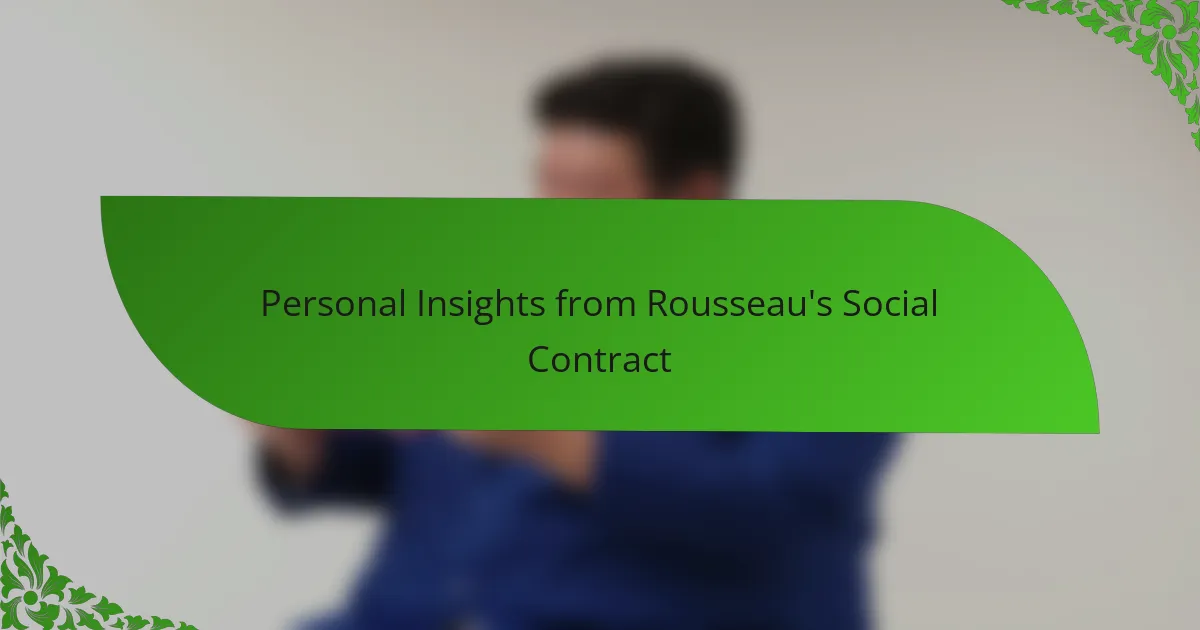
Personal Insights from Rousseau’s Social Contract
Reading Rousseau’s idea of the “general will” made me pause and ask myself: do I really consider the common good as much as my own interests? This question nudged me toward a more community-minded perspective, but it also sparked some inner conflict—I value my individuality deeply, yet I see how much healthier society is when we prioritize shared goals.
I vividly recall a moment when I reflected on Rousseau’s assertion that true freedom comes from laws we consent to ourselves. It made me rethink what freedom means in my own life. Is freedom just doing whatever I want, or is it, as Rousseau suggests, actively shaping the rules that affect me? That realization empowered me to engage more consciously in civic matters, even in small ways.
There was also a lingering discomfort I had about sacrificing natural liberty for security. I remember wrestling with that unease—how much freedom am I willing to give up for order? Over time, I came to accept that this balance isn’t a betrayal of liberty but a necessary part of peaceful coexistence. Does that trade-off feel different to you after some thought? For me, it’s become a more nuanced, personal understanding.
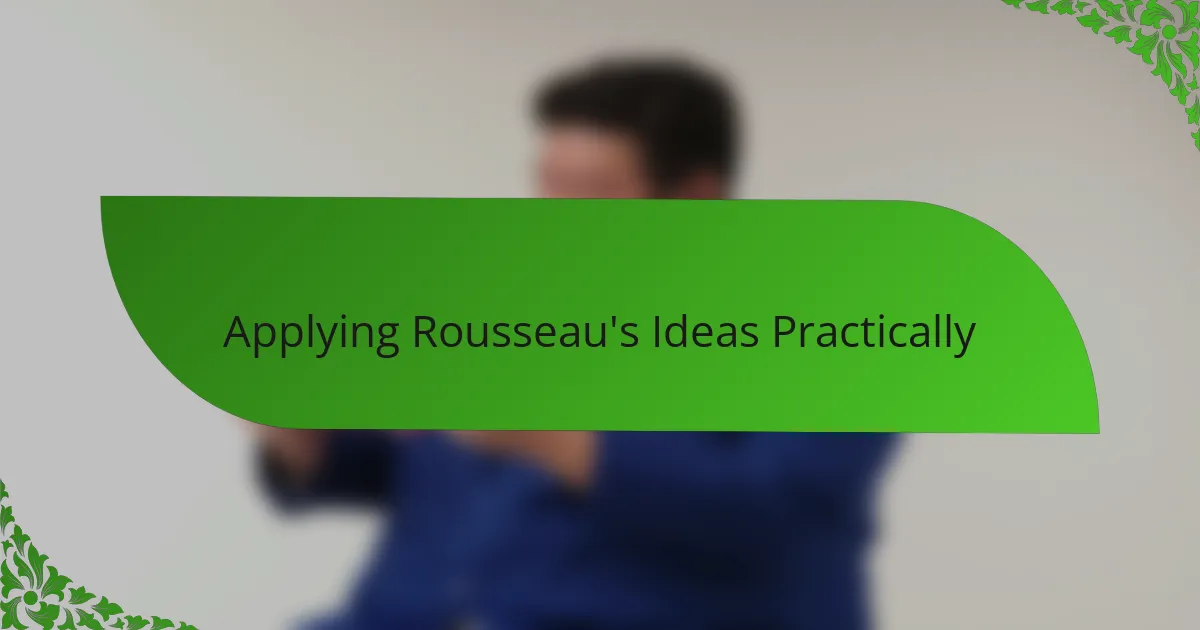
Applying Rousseau’s Ideas Practically
Applying Rousseau’s ideas practically made me realize how challenging it is to align personal desires with the general will in everyday life. I often wondered: how do communities actually find that common ground when opinions are so diverse? From my experience, it takes ongoing dialogue and a genuine willingness to listen, not just a majority vote, to make the social contract more than a theoretical ideal.
I’ve also tried applying Rousseau’s notion of freedom through participation in small, concrete ways—like attending local meetings or getting involved in community decisions. It’s empowering to see how contributing to the rules that govern us can change my sense of freedom from passive acceptance to active ownership. Have you noticed how this kind of engagement shifts your relationship with the rules around you? For me, it brings theory down to earth and makes citizenship feel practical and meaningful.
At times, I’ve wrestled with the tension Rousseau describes between liberty and security in my own life—such as when public safety measures feel restrictive but also necessary. This ongoing negotiation reminded me that the social contract is not a one-time agreement but a continual balancing act. How do you navigate this trade-off personally? Reflecting on this keeps Rousseau’s theory alive and relevant, shaping how I think about freedom every day.
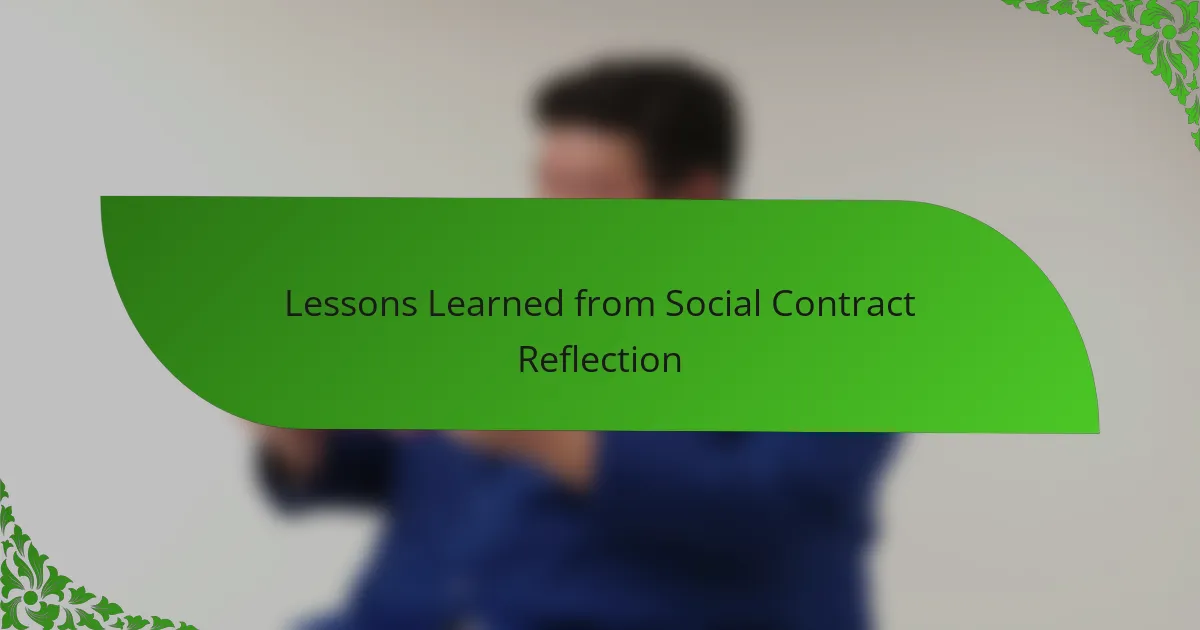
Lessons Learned from Social Contract Reflection
Reflecting on Rousseau’s social contract taught me that understanding society’s rules isn’t just an academic exercise—it’s a way to see how deeply connected we are to others. I remember feeling a mix of clarity and discomfort realizing that my personal freedom depends so much on collective agreement. Have you ever paused to think about how much you rely on unseen contracts to make daily life possible?
Another lesson that stood out is how essential trust and shared responsibility are for any social contract to hold. It made me question not only my role as a citizen but also how willing I am to compromise for the common good. This reflection wasn’t always easy; it stirred inner conflict between valuing my individuality and recognizing the benefits of cooperative living.
Finally, I learned that social contracts aren’t static—they require ongoing reflection and participation. This insight nudges me to stay engaged with community matters rather than retreating into passivity. Does this idea of continuous negotiation resonate with you? For me, it transformed how I perceive freedom—not as something granted once but as a dynamic, lived experience shaped by collective will.